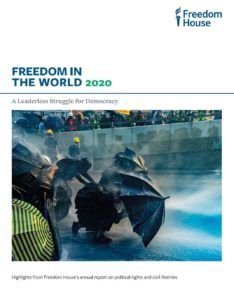 The wider geopolitical effect of the COVIS-19 pandemic will likely turbocharge trendlines that were already creating a much more complicated and competitive landscape for the United States, argues William J. Burns, President of the Carnegie Endowment, former deputy secretary of state, and author of The Back Channel: A Memoir of American Diplomacy and the Case for its Renewal.
The wider geopolitical effect of the COVIS-19 pandemic will likely turbocharge trendlines that were already creating a much more complicated and competitive landscape for the United States, argues William J. Burns, President of the Carnegie Endowment, former deputy secretary of state, and author of The Back Channel: A Memoir of American Diplomacy and the Case for its Renewal.
The liberal international order will become less liberal and less ordered. Following the greatest economic blow since the Great Depression, the flow of goods and people across borders will become less free, he writes for The Atlantic:
A shared sense of insecurity will intensify great-power competition, accelerate regional disorders, and worsen humanitarian crises in parts of the world already brimming with conflicts and refugees. New technologies will solidify authoritarian control and challenge democratic governance. International institutions will teeter, split apart by major-power rivalry and starved for resources, undermining prospects for a coordinated response to other looming global challenges—none more existential than climate change.
 In a now-declassified January 1993 memo, which I drafted as head of the State Department’s Policy Planning Staff, we warned the incoming Clinton administration that the unfolding international landscape would prove “enough to almost—almost—make one nostalgic for the familiar discipline and order of the Cold War.” We flagged several traps, adds Burns, a National Endowment for Democracy (NED) board member:
In a now-declassified January 1993 memo, which I drafted as head of the State Department’s Policy Planning Staff, we warned the incoming Clinton administration that the unfolding international landscape would prove “enough to almost—almost—make one nostalgic for the familiar discipline and order of the Cold War.” We flagged several traps, adds Burns, a National Endowment for Democracy (NED) board member:
- The first was “the danger of hubris” born of the simple fact that “for the first time in fifty years we do not face a global military adversary.” America’s commanding position, I wrote, “did not imply American dominance of a unipolar world. Power, especially economic power, is too diffuse for a simple construct.” As I looked ahead, it seemed “certainly conceivable that a return to authoritarianism in Russia or an aggressively hostile China could revive such a global threat.” And while democracy seemed ascendant, “democratizing societies that fail to produce the fruits of economic reform quickly, or fail to accommodate pressures for ethnic self-expression, may slide into other ‘isms’, including nationalism or religious extremism or some combination of the two.”
- The second was the trap of bumper stickers—the doomed search for a neat framework to replace the Cold War’s strategy of “containment,” which for decades had provided intellectual clarity and mobilized popular support. A strategy premised on “enlargement” of the coalition and ideas that had won the Cold War was enticing, although as one commentator pointed out at the time, the term sounded more like a prostate condition than a political rallying call….
- The third trap was losing the connection between our global leadership and our domestic priorities….

POMED
East Asian countries have demonstrated that a robust regime of surveillance is essential to fighting a pandemic, notes Nicholas Wright, a medical doctor and neuroscientist who works on emerging technologies and global strategy at University College London, New America, and Georgetown University Medical Center.
Western democracies must rise to meet the need for “democratic surveillance” to protect their own populations. But what models can the West demonstrate that take advantage of the great benefits of AI-enabled surveillance without sacrificing liberal values? Western liberal democracies must be unafraid in trying to sharpen their powers of surveillance for public health purposes, he writes for Foreign Affairs:
There is nothing oxymoronic about the idea of “democratic surveillance.” After all, in the past two centuries, the United States and United Kingdom have simultaneously strengthened their democratic institutions while increasing their powers of surveillance. Looking ahead, liberal democracies should identify which methods practiced in East Asia to contain COVID-19 are worthy of emulation and avoid those requiring intrusive surveillance. In particular, Western countries should learn from the speed and scale of interventions in East Asia.
 “It’s hard to imagine that being rolled out in the U.S.,” Adrian Shahbaz, research director of technology and democracy at Freedom House, told Newsweek when asked about surveillance apps like the ones used in China.
“It’s hard to imagine that being rolled out in the U.S.,” Adrian Shahbaz, research director of technology and democracy at Freedom House, told Newsweek when asked about surveillance apps like the ones used in China.
“It comes down to key differences between democratic and authoritarian regimes. In places like China, the state places less emphasis on individual rights,” he added. “Authorities have far greater leeway for instituting harsh and intrusive restrictions. In the eyes of the Chinese Communist Party, the ends often justify the means.”
“China isn’t just a surveillance state—it’s a model for digital authoritarianism… the government channels technology like biometrics, surveillance, and big data for controlling citizens’ behavior.”

 Core democratic principles are under pressure, and governments’
Core democratic principles are under pressure, and governments’ 





